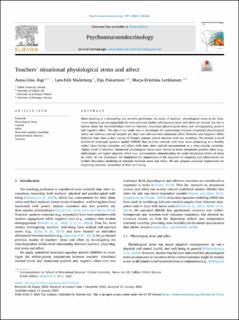| dc.contributor.author | Jõgi, Anna-Liisa | |
| dc.contributor.author | Malmberg, Lars-Erik | |
| dc.contributor.author | Pakarinen, Eija Kristiina | |
| dc.contributor.author | Lerkkanen, Marja-Kristiina | |
| dc.date.accessioned | 2023-09-13T08:16:13Z | |
| dc.date.available | 2023-09-13T08:16:13Z | |
| dc.date.created | 2023-04-17T14:38:28Z | |
| dc.date.issued | 2023 | |
| dc.identifier.citation | Jõgi, A.L., Malmberg, L-E., Pakarinen, E., Lerkkanen, M-K. (2023) Teachers’ situational physiological stress and affect. Psychoneuroendocrinology, 149, 106028 | en_US |
| dc.identifier.issn | 0306-4530 | |
| dc.identifier.uri | https://hdl.handle.net/11250/3089042 | |
| dc.description.abstract | Since teaching is a demanding and stressful profession, the study of teachers’ physiological stress in the classroom setting is an emerging field. In cross-sectional studies self-reported stress and affect are related, but less is known about the intraindividual relations between situational physiological stress and corresponding positive and negative affect. The aim of our study was to investigate the associations between situational physiological stress (six salivary cortisol samples per day) and self-reported situational affect (Positive and Negative Affect Schedule four times a day) among 61 Finnish primary school teachers over two workdays. We present a novel multilevel structural equation model (MSEM) that includes cortisol, with time since awakening as a flexibly coded time-varying covariate and affect with time since cortisol measurement as a time-varying covariate. Higher levels of teachers’ situational physiological stress were related to lower situational positive affect (e.g., enthusiasm) and higher negative affect (e.g., nervousness), demonstrating the acute/situational effects of stress on affect. In our discussion, we emphasize the importance of the sequence of sampling and observations for further theoretical modeling of relations between stress and affect. We also propose practical implications for improving teachers’ awareness of their well-being. | en_US |
| dc.language.iso | eng | en_US |
| dc.publisher | Elsevier Ltd. | en_US |
| dc.rights | Navngivelse 4.0 Internasjonal | * |
| dc.rights.uri | http://creativecommons.org/licenses/by/4.0/deed.no | * |
| dc.subject | utdanningsvitenskap | en_US |
| dc.subject | psykologi | en_US |
| dc.subject | lærere | en_US |
| dc.subject | stress | en_US |
| dc.title | Teachers’ situational physiological stress and affect | en_US |
| dc.type | Peer reviewed | en_US |
| dc.type | Journal article | en_US |
| dc.description.version | publishedVersion | en_US |
| dc.rights.holder | © 2023 The Authors | en_US |
| dc.subject.nsi | VDP::Samfunnsvitenskap: 200::Pedagogiske fag: 280 | en_US |
| dc.subject.nsi | VDP::Samfunnsvitenskap: 200::Psykologi: 260 | en_US |
| dc.source.volume | 149 | en_US |
| dc.source.journal | Psychoneuroendocrinology | en_US |
| dc.identifier.doi | 10.1016/j.psyneuen.2023.106028 | |
| dc.identifier.cristin | 2141335 | |
| dc.source.articlenumber | 106028 | en_US |
| cristin.ispublished | true | |
| cristin.fulltext | original | |
| cristin.qualitycode | 2 | |

